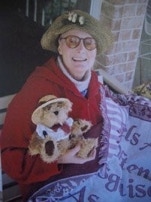Director’s Statement

When my Mom was diagnosed with a brain tumor in the fall of 2000, my instinct was: "I need to document this. This will make a great movie about the triumph of the human spirit." I'm not sure how I knew the human spirit would triumph before the trials even began, but I guess I was then, and continue to be, an optimist. I'm also a filmmaker, and it seemed like a natural thing for me to do in order to deal with this, and make sense of what was going on. Honestly, it was also a defense mechanism, putting a "layer" between myself and the events going on.
My family quickly warmed up to the ever-present camera and realized that this was just my way of dealing with such a difficult, confusing event. Life was turned upside down for all of us, and we just did our best to cope with it. Looking back, it's hard to believe it took me such a long time to realize that. I wanted to pretend that things were still going on as planned, that life was how I wanted it to be. Eventually an event like this made it clear to me that all my plans are fragile and that I shouldn't try to over control things. That I should go with the flow. (Conversely, making this movie was a way for me to control an uncontrollable situation. So even the very act of creating this film is a contradiction. Showing how something like this is far more confusing than a simple statement can convey).
The "production" really involved just me, a Sony DV camera and occasionally a wireless microphone. It was nothing fancy; often the sound was from the on camera mic. The places I shot were homes and hospitals. And all the people you see in the film said it was fine for me to tape them. If anyone didn't want to be on tape I didn't do it. Out of respect for them, and also, just in case I got the greatest footage on earth and couldn't use it. In the end I had 108 hours of footage that I had to edit down to a movie that ended up being 99 minutes. So I'm glad I didn't have the extra footage.
My goal was to tape the entire experience when it was happening. I wanted to show what it was like, not have someone "tell" the viewer what it was like. I did end up shooting hours of interviews just in case, and to get peoples thoughts on the events, but ended up not using them. It just felt better to let the events play out and let our attitudes and actions tell the story.
Despite my own heavy resistance, I'm glad I continued making this movie. It's been an emotional rollercoaster but it's helped me in many ways. It has also been very interesting to see how others who were involved in this struggle, family and friends, view the film since each of them experienced it differently than I did. And to talk about what they went through. After all, they had their own journey. My hope is that everyone who gets a chance to see this film will have a powerful journey as well.
--Craig Ouellette
All Films, Stills, Graphics & Text Copyright ©2008 Craig Ouellette.

